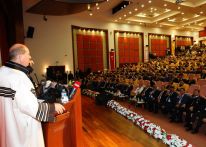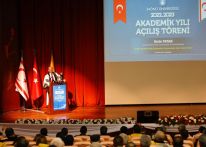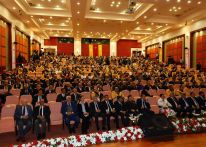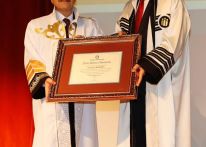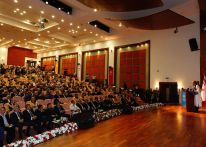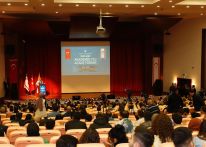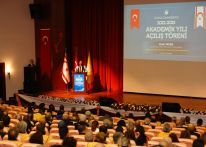President Ersin Tatar inaugurates the 2022-2023 Academic Year Opening Ceremony of Malatya İnönü University
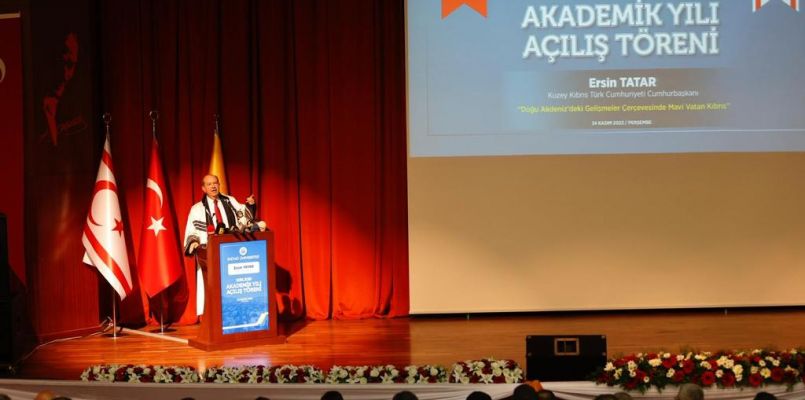
“Sustaining a Turkic State in the eastern Mediterranean is important for the future of the Turkish nation.”
Photos
President Ersin Tatar attended the 2022-2023 Academic Year Opening Ceremony of İnönü University as part of his two-day contacts in Malatya, Türkiye.
President Tatar, who held the first lecture of the academic year in the form of a conference titled "Blue Homeland Cyprus within the Framework of Developments in the Eastern Mediterranean", was presented with an honorary doctorate by the Senate of İnönü University for his contributions to regional peace and the TRNC's struggle for existence.
President Ersin Tatar said: “The survival of a Turkish State in the eastern Mediterranean is important for the future of the Turkish nation. Our way is the way of the mujahideen [Freedom Fighters], the way of the Mehmetçik [Turkish forces].”
The President underlined the importance of “continuing the struggle in the national cause in unity and solidarity with Motherland Türkiye,” adding that “the Turkish Cypriot People have inherent rights in Cyprus and will never accept becoming a minority of the Greek Cypriots.”
Pointing to the tangible successes of the TRNC, President Tatar stated that despite the difficulties and unjust isolation imposed on the country, the Republic is continuing to develop and grow in different sectors. “TRNC-based universities are attracting students from 144 different countries,” the President said.
President Tatar, who shared important points about the history of Cyprus and the struggle from the 1570s to date, reminded that the island of Cyprus was ruled by the Ottoman Empire for 350 years, and that the island was leased to Great Britain in 1878 on the condition that it was to be returned after a certain period of time. He noted that after the events in Çanakkale, Britain had colonised the island and had excluded it from the National Pact through the Treaty of Laussaune.
“Agitation for the annexation of the island of Cyprus to Greece had culminated during the British rule of the island, and the Turkish population had decreased and the Greek population bolstered during this period stretching back to the 1920s,” the President said. He explained that the Turkish Cypriot people have “always looked towards Anatolia” during the times of hardship and difficulties inflicted on Turkish Cypriots.
President Tatar added that the Turkish Cypriot People had always waited for support from Motherland Türkiye in times of danger, and lived with the belief that “the Turkish army will one day come and liberate us”. He said despite the Greek Cypriots' efforts to annex the island to Greece, the Turkish Cypriot people continued their honourable struggle and did not succumb to these efforts. He added that in July 1974, the Greek junta had staged a coup d’état and had declared the ‘Hellenic Republic of Cyprus’. He said Türkiye was obliged to undertake the Cyprus Peace Operation by invoking the rights enshrined in the Treaty of Guarantee, in order to save the Turkish Cypriot people.
President Tatar added: “We knew that the Turkish forces would embrace the island, and would bring peace and stop the bloodshed and the atrocities being committed against us” adding that the “current borders were drawn following the struggle of the mujahideen and the Mehmetçik, and that there has been no conflict on the island since”.
President Tatar explained that the Greek Cypriot Side have rejected 15 solution-based proposals and ideas over the past several decades. He said negotiations for a federal based settlement have been exhausted due to Greek Cypriot rejections to share power and prosperity on the basis of equality under a partnership deal with the Turkish Cypriot People.
President Tatar stated that the Turkish Cypriot People have been governing themselves after being ejected from the State apparatus through force of arms in 1963, adding: “We are a sovereign equal people on the island of Cyprus. Nobody has the right to ask us to abandon this inherent right, which emanates from history and treaties. The Greek Cypriot Side has shown time-and-again that, although they pay lip service to wanting a settlement, they reject federal-based plans and basis.
Conveying the developments following the UN Comprehensive Settlement [Annan] Plan of 2004 that was rejected by the Greek Cypriot Side which was based on a federation, the President said that “the EU rewarded the Greek Cypriot Side that had rejected the Plan in the separately held simultaneous referenda by making them members of the bloc in the name of the whole island, without Turkish Cypriots' consent.”
President Tatar added that the Greek Cypriot Side was attempting to utilise EU mechanisms in order to exclude the Republic of Türkiye – which is also not an EU member state, and to demolish the Treaty of Guarantee – which he said is the lifeline of Turkish Cypriots that provided the legal basis for the intervention by Türkiye in 1974 that stopped the acts of genocide being committed against Turkish Cypriot people.
President Tatar stated that he has put forward a two State vision that is fully supported by the Republic of Türkiye, that is based on the cooperative relationship of the two Sides. “This will make Cyprus a beacon of peace, of stability and prosperity. We want to depart from the unacceptable status quo which the Greek Cypriot Side has for many years sought to perpetuate,” the President said.
President Tatar also referred to the call made by President of the Republic of Türkiye, Recep Tayyip Erdoğan, at the UN General Assembly in New York on September 20, for the formal recognition of the TRNC by the international community; and the observer membership of the TRNC at the Organisation of Turkic States. “All of these are important milestones for the Turkish Cypriot Side and strengthen the two State policy,” President Tatar said.
President Tatar also talked about the new proactive policies of the TRNC for the preservation of the Turkish-Greek equilibrium in the eastern Mediterranean, emphasising that the island of Cyprus, the eastern Mediterranean and the Blue Homeland [doctrine] are all important geopolitical factors. He added that he was also honoured to be speaking about these important issues at a university named after İsmet İnönü.
“We have achieved great success in recent years in restoring the balance in the eastern Mediterranean,” the President said. “Now we said sovereign equality, we said two States, we said we will not be patched onto the Greek Cypriot usurped State. We said we would never allow them to drag Turkish Cypriots into the EU and exclude Türkiye under a federal roof.”
President Tatar said: “The survival of a Turkish State in the eastern Mediterranean is needed for sustainable peace, for future generations and for all of us.” He said despite having a population of 1 million, the Greek Cypriot Side was able to exercise a veto against Türkiye that had a population of 80 million. He said the Turkish Cypriot people will continue to seek fairness and justice in their national cause together in unity and with solidarity with Motherland Türkiye.
"It is a fundamental mistake to support the mentality of the Greek Cypriots in their position that all of the resources of the eastern Mediterranean belong solely to them”
Referring to the hydrocarbons and resources in the eastern Mediterranean, the President called upon the international community to realise that the Turkish Cypriot People also have rights to these resources. He said it would be a fundamental mistake for support to be given to the Greek Cypriot mentality, which sees itself as being the sole authority and able to exploit these resources.
President Tatar added that one of his cooperation proposals he has sent to the Greek Cypriot leader included a section on how the two Sides can benefit by working in cooperation with regards to hydrocarbons in the eastern Mediterranean. But he said the Greek Cypriot Side has not replied to these proposals.
“We [Turkish Cypriots] have same rights as that of the Greek Cypriot side on hydrocarbons, in the economic exclusive zone, maritime jurisdiction areas and other continental shelf issues.”


